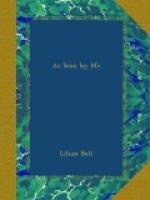Paris is very educational. I can imagine its influence broadening some people so much that their own country could never be ample enough to cover them again. I can imagine it narrowing others so that they would return to America more of Puritans than ever. It is amusing, it is fascinating, it is exciting, it is corrupting. The French must be the most curious people on earth. How could even heavenly ingenuity create a more uncommon or bewildering contradiction and combination? Make up your mind that they are as simple as children when you see their innocent picnicking along the boulevards and in the parks with their whole families, yet you dare not trust yourself to hear what they are saying. Believe that they are cynical, and fin de siecle, and skeptical of all women when you hear two men talk, and the next day you hear that one of them has shot himself on the grave of his sweetheart. Believe that politeness is the ruling characteristic of the country because a man kisses your hand when he takes leave of you. But marry him, and no insult as regards other women is too low for him to heap upon you. Believe that the French men are sympathetic because they laugh and cry openly at the theatre. But appeal to their chivalry, and they will rescue you from one discomfort only to offer you a worse. The French have sentimentality, but not sentiment. They have gallantry, but not chivalry. They have vanity, but not pride. They have religion, but not morality. They are a combination of the wildest extravagance and the strictest parsimony. They cultivate the ground so close to the railroad tracks that the trains almost run over their roses, and yet they leave a Place de la Concorde in the heart of the city.
You can buy the wing of a chicken at a butcher’s and take it home to cook it. But your bill at a restaurant will appall you. Water is the most precious and exclusive drink you can order in Paris. Imagine that—you who let the water run to cool it! In Paris they actually pay for water in their houses by the quart.
Artichokes, and truffles, and mushrooms, and silk stockings, and kid gloves are so cheap here that it makes you blink your eyes. But eggs, and cream, and milk are luxuries. Silks and velvets are bewilderingly inexpensive. But cotton stuffs are from America, and are extravagances. They make them up into “costumes,” and trim them with velvet ribbon. Never by any chance could you be supposed to send cotton frocks to be washed every week. The luxury of fresh, starched muslin dresses and plenty of shirt-waists is unknown.
I never shall overcome the ecstasies of laughter which assail me when I see varieties of coal exhibited in tiny shop windows, set forth in high glass dishes, as we exploit chocolates at home. But well they may respect it, for it is really very much cheaper to freeze to death than to buy coal in Paris.
The reason of all this is the city tax on every chicken, every carrot, every egg brought into Paris. Every mouthful of food is taxed. This produces an enormous revenue, and this is why the streets are so clean; it is why the asphalt is as smooth as a ballroom floor; it is why the whole of Paris is as beautiful as a dream.




